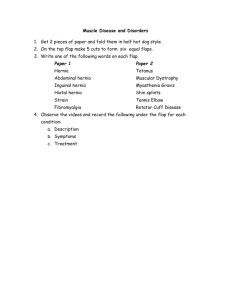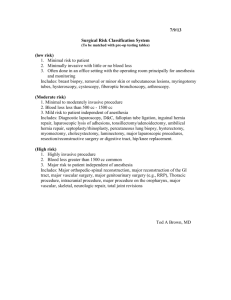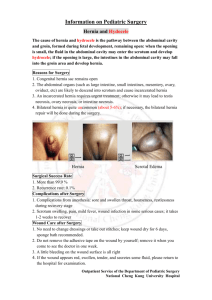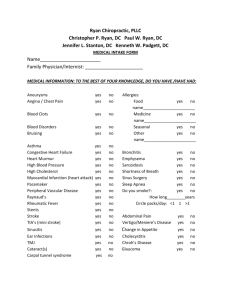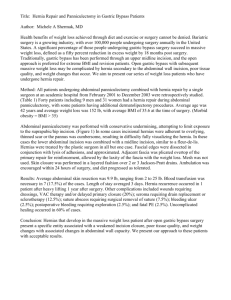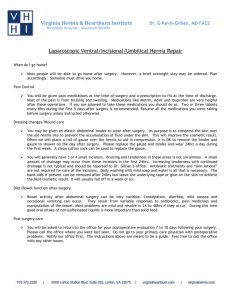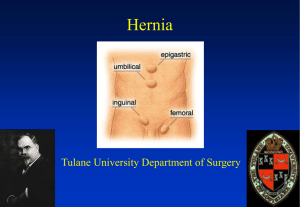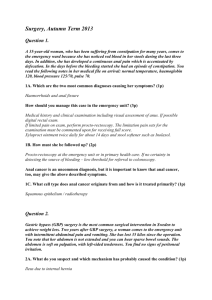Meridian Surgical Services, Inc
advertisement
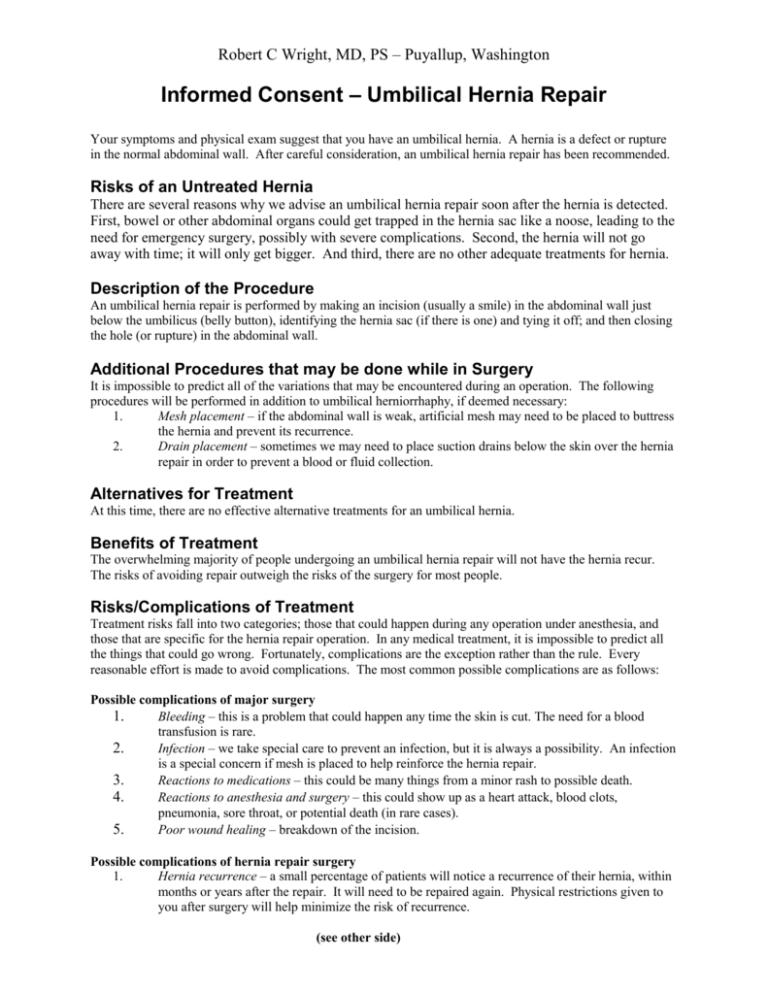
Robert C Wright, MD, PS – Puyallup, Washington Informed Consent – Umbilical Hernia Repair Your symptoms and physical exam suggest that you have an umbilical hernia. A hernia is a defect or rupture in the normal abdominal wall. After careful consideration, an umbilical hernia repair has been recommended. Risks of an Untreated Hernia There are several reasons why we advise an umbilical hernia repair soon after the hernia is detected. First, bowel or other abdominal organs could get trapped in the hernia sac like a noose, leading to the need for emergency surgery, possibly with severe complications. Second, the hernia will not go away with time; it will only get bigger. And third, there are no other adequate treatments for hernia. Description of the Procedure An umbilical hernia repair is performed by making an incision (usually a smile) in the abdominal wall just below the umbilicus (belly button), identifying the hernia sac (if there is one) and tying it off; and then closing the hole (or rupture) in the abdominal wall. Additional Procedures that may be done while in Surgery It is impossible to predict all of the variations that may be encountered during an operation. The following procedures will be performed in addition to umbilical herniorrhaphy, if deemed necessary: 1. Mesh placement – if the abdominal wall is weak, artificial mesh may need to be placed to buttress the hernia and prevent its recurrence. 2. Drain placement – sometimes we may need to place suction drains below the skin over the hernia repair in order to prevent a blood or fluid collection. Alternatives for Treatment At this time, there are no effective alternative treatments for an umbilical hernia. Benefits of Treatment The overwhelming majority of people undergoing an umbilical hernia repair will not have the hernia recur. The risks of avoiding repair outweigh the risks of the surgery for most people. Risks/Complications of Treatment Treatment risks fall into two categories; those that could happen during any operation under anesthesia, and those that are specific for the hernia repair operation. In any medical treatment, it is impossible to predict all the things that could go wrong. Fortunately, complications are the exception rather than the rule. Every reasonable effort is made to avoid complications. The most common possible complications are as follows: Possible complications of major surgery 1. Bleeding – this is a problem that could happen any time the skin is cut. The need for a blood transfusion is rare. 2. Infection – we take special care to prevent an infection, but it is always a possibility. An infection is a special concern if mesh is placed to help reinforce the hernia repair. 3. Reactions to medications – this could be many things from a minor rash to possible death. 4. Reactions to anesthesia and surgery – this could show up as a heart attack, blood clots, pneumonia, sore throat, or potential death (in rare cases). 5. Poor wound healing – breakdown of the incision. Possible complications of hernia repair surgery 1. Hernia recurrence – a small percentage of patients will notice a recurrence of their hernia, within months or years after the repair. It will need to be repaired again. Physical restrictions given to you after surgery will help minimize the risk of recurrence. (see other side) 2. 3. 4. Wound hematoma – occasionally a large bruise will form over the wound. If this is severe or happens soon after surgery, we may need to re-explore the wound in the operating room. Prolonged numbness/pain in the incisional area – a patient may, on rare occasion, note prolonged numbness or pain in the surgical area from nerve injury or scar entrapment. Bowel or bladder injury – an injury to a portion of the bowel or urinary bladder is uncommon but possible during this operation. Should either occur, necessary steps will be taken to repair the injury. It may also be necessary to have a second operation for this purpose. Anticipated Recovery/Expected Rehabilitation Recovery is quite variable, depending on the individual. You will recover faster if you begin walking on the evening of surgery. For your safety, do not drive a motor vehicle or operate dangerous machines for a week following surgery, and while on pain medication. Also, do not lift anything greater than fifteen pounds for several weeks after surgery. Then you will only be restricted from activity that causes discomfort and this usually ends six weeks following surgery. Consent for Treatment I understand my condition to be an umbilical hernia and am aware of its risks if untreated. I have read and understand the above explanation of the procedure being proposed. My surgeon has answered my questions, and I choose to proceed with surgery. I understand that every operation may yield unexpected findings. I give the surgeon permission to act on his best judgment in deciding to remove or biopsy tissues that appear to be diseased, understanding that complications may arise from that action. I understand that while most people receiving an umbilical hernia repair benefit from the proposed operation, I may not. My condition may not improve, and it may worsen. No absolute guarantee can be made. HIPAA: Before and after surgery, unless otherwise requested in writing by you, visitors whom you invite to attend the surgery will be informed of the surgical finding, your surgical status, and anticipated recovery issues for effectiveness of communications. Because of the anesthetic, you may or may not remember these important details. PRINT NAME__________________________________________________________________________ SIGNATURE ______________________________________________ DATE _________________ WITNESS ________________________________________________ DATE _________________ SURGEON ________________________________________________ DATE _________________ RELATIONSHIP TO PATIENT IF SIGNATURE OF LEGAL GUARDIAN ________________________________ I waive the right to read this form, and do not want to be educated and informed of treatment risks; nonetheless I understand the need for this surgery and grant permission to the surgeon to proceed on my behalf. SIGNATURE _____________________________________________________ DATE ______________ rev6-03/kab
